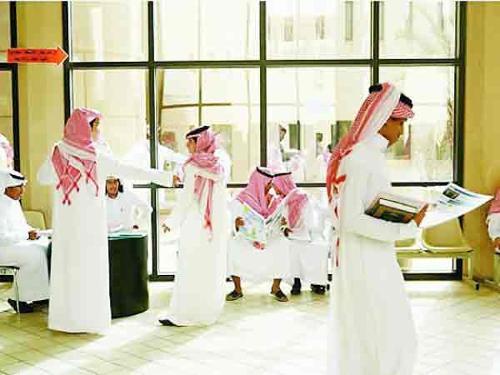
Kingdom’s universities have a bigger role to play
The Kingdom has, over the past few years, seen a wave of extremism that has tried to influence the minds of young Saudis. Certain elements on satellite channels, websites and social media networks have hijacked the will and mind of young citizens and brainwashed them.
Al-Riyadh daily reports that none of the Kingdom’s 58 universities, 28 of which are public, have given the issue any priority even though they are in a position to dispel the negative notions and promote patriotism and social solidarity.
With several initiatives failing to eradicate extremism, experts believe a national strategy, spearheaded by institutions of higher education, is needed to combat extremist thoughts on all levels.
Curricula
Dr. Khalil Al-Khalil, an academician and a writer, said universities should reinforce the concept of citizenship in students’ minds and ensure that the environment available to them is conducive to effective learning.
He blamed the bureaucratic measures adopted by most university administrations for part of the problem and said curricula should be revamped, with importance given to research and debate.
“University affairs are managed by bureaucrats, not by academic experts. The majority of university presidents spends their time outside the university and have little communication with other departments and deans within the institution,” he said.
“Saudi universities have failed to keep pace with the development momentum in the country and have lagged behind.
They have closed the doors of their lecture rooms; as a result, young men had to find alternative places.
“Some of the young men were attracted by foreign organizations. Are university libraries and lecture rooms open or closed to all? How many hours a day are such facilities open to students? Do students have a close relationship with their universities? These are important questions that should be answered.
Our universities should rise to the occasion and revamp their curricula and open the doors for research and serious discussion,” he added.
Strategic studies
Dr. Salih Al-Saqri, former Saudi cultural attaché to China and professor of international relations, called for setting up strategic centers inside universities to deal with the issue of extremism.
Al-Saqri said it is the responsibility of academic institutions to establish and run such centers.
Dr. Ibrahim Al-Meshaiqeh, Al-Qassim University faculty member, blamed Saudi universities for their failure to play an effective role in dealing with the rapid events and global conflicts seeking to shake the security and beliefs of the Kingdom’s citizens.
“Some universities seem to be living in another world as if they don’t know what’s transpiring on the ground. They should be blamed for the chasm created between academic institutions and citizens,” he noted.
National objectives
Dr. Rima Haimed, assistant professor, Umm Al-Qura University, said instilling values of citizenship in students’ minds will raise their awareness of the importance of national objectives the country strives to achieve.
It will also enhance the values of responsibility and trust in them. “Today’s political events make it necessary for official agencies and educational institutions to play a role in this process,” she said.
Dr. Adel Al-Omari, assistant professor of Islamic studies, Al-Qassim University, said universities do not have any tangible influence on social thought although the government allocates huge amounts of money for them.
“Frankly speaking, our universities don’t reinforce a culture of pluralism and have departed from moderate thought.
They’re still clinging to traditional thoughts and don’t emphasize the importance of respecting all human beings regardless of their religion, race and thinking,” he said.
Traditional role
Dr. Zayed Al-Harithi, Saudi cultural attaché to Malaysia, said most universities have failed to carry out their national and religious duties toward youth by following outdated curricula.
“They have not planned their curricula in a way that focuses on the supreme objectives of religion. Not enough attention is given to prepare educators to be role models for students.
“Educational institutions should reformulate their objectives, missions and purposes to design clear-cut strategies, short-term and long-term, that build educated and effective youth,” Al-Harithi said.
























